#infrastructure and land value
Explore tagged Tumblr posts
Text
7 Key Factors That Drive Land Appreciation in Nigeria
7 Key Factors That Drive Land Appreciation in Nigeria Investing in land is one of the most secure and time-tested ways to build long-term wealth. However, not all land investments are equal. The key to maximizing returns lies in understanding what drives land appreciation—that is, the increase in a land’s value over time. Whether you’re a first-time buyer or a seasoned investor, knowing the…
#economic impact on land#factors affecting land value#how land appreciates#increase in land value#infrastructure and land value#land appreciation#land development ROI#land investment Nigeria#land use and zoning impact#land value growth#profitable land investment#real estate appreciation#real estate investing tips#urbanization and property#what is land appreciation
0 notes
Text

Israel is burning and bulldozing tree crops at historic rates. These trees would take years to grow back - and that's without factoring in the time it would take to detoxify the soil. (2/13)
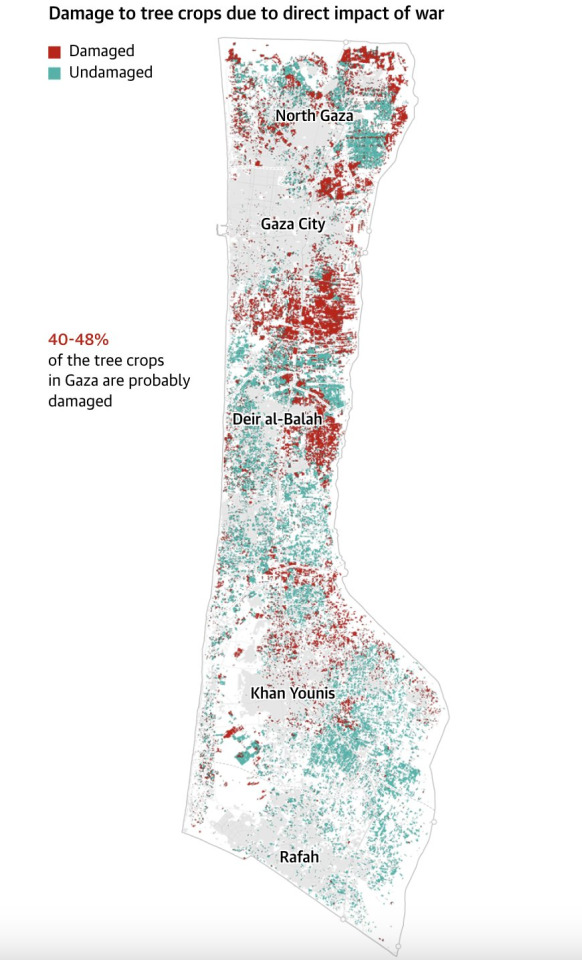
It gets worse. 23% of greenhouses have been destroyed in their entirety. (3/13)
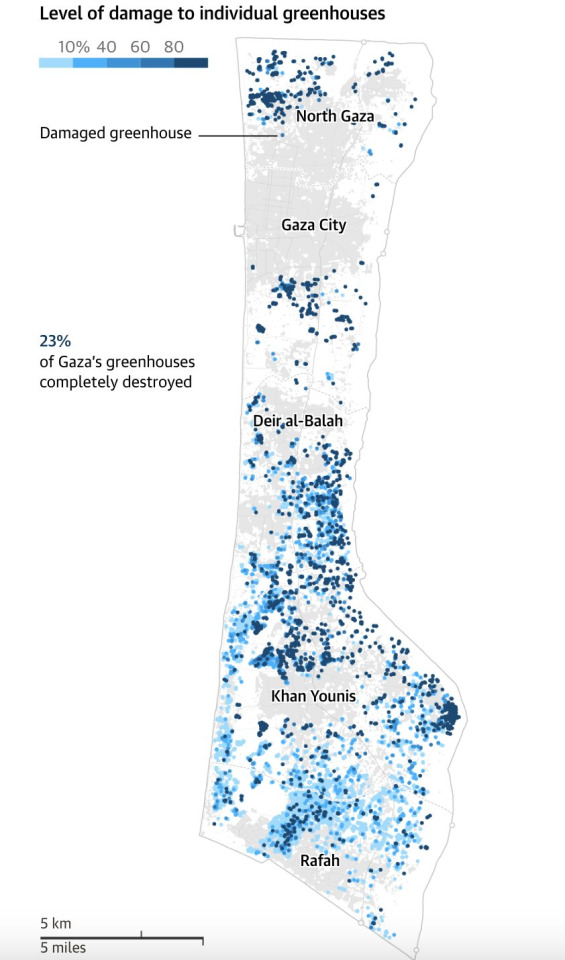
Destroying up to 48% of tree crops and 23% of greenhouses is a horrendous crime in itself, but, when you factor in Israel blocking food aid and literally killing food aid professionals, you start to see the scale of the crime in full. (4/13)
Look at the difference. See the land before. See it after. Do not turn away. (5/13)
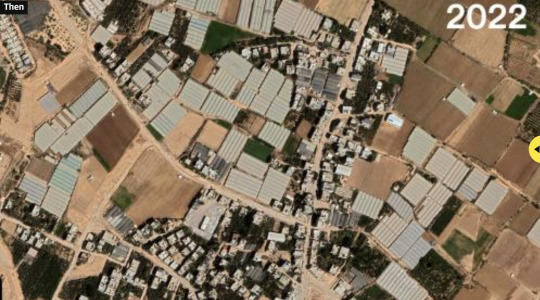
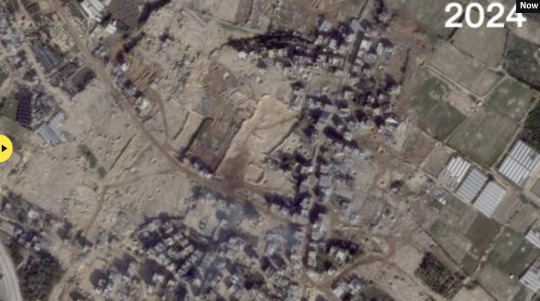
Restoring the land will be profoundly difficult. The soil now contains asbestos, heavy metals, and even undetonated explosives. (6/13)
Waste disposal infrastructure is in ruins. Sewage treatment systems are failing. (7/13)
People are burning plastic to heat food. Fumes from bombs hang in the air. (8/13)
This is not "just" about nature. This is about the food and the air and the water and the land being deprived of life. It is about a whole population being denied its sustenance. (9/13)
A comprehensive report about this issue is in the Guardian. They are one of the few publications to cover the siege on Gaza from this angle. The full story is here: (10/13)
There is also some reporting on this in InsideClimateNews: (11/13)
Here at Climate Defiance we have been clear in calling for a ceasefire since October. We wage our peaceful struggle because we believe in the inherent value of humanity - and in the need to see the humanity in each other. (12/13)
We fight for thriving ecosystems because we fight for life. Both are under attack right now. Do not look away. Do not stay silent. Moments like these are a test of our moral fabric. (13/13)
5K notes
·
View notes
Text
Investing Wisely: Seizing the Opportunity of Buying Affordable Land in Kenya's Suburbs for Future Family Homes
Planting Seeds for Tomorrow: Building a Family Legacy Through Strategic Land Investment The dream of owning a family home is one that many share, and in Kenya’s evolving real estate landscape, buying affordable land in the suburbs presents a golden opportunity. While the initial investment might be modest, the long-term potential for growth is substantial. This article delves into the strategy of…

View On WordPress
#Affordable land#family home#family legacy#future planning#growth areas#infrastructure development#infrastructure projects#Kenya suburbs#legal clarity#long-term vision#property investment#property value appreciation#real estate strategy#strategic investment#urbanization
0 notes
Text


Lesmana Enterprise and Willow Creek: Takeover Talks or Just a Round of Golf?
By Business Simsider SimNation
San Myshuno—The markets are abuzz with speculation after Kieran Lesmana, CEO of Lesmana Enterprise, was spotted on the greens of Willow Creek Country Club alongside wife Seo Yeon Kim, Mayor Harlan Scott and West Simnation State Senator Albert Fryer. While a golf game might seem like a harmless pastime for the billionaire mogul, industry insiders and market analysts believe this meeting may signal something far more significant: a potential Lesmana-backed corporate expansion into Willow Creek.
Lesmana Enterprise, one of the most powerful conglomerates in SimNation, has long been known for its strategic urban developments and high-profile acquisitions. While no official statements have been made, Lesmana Enterprise's stock (LSMN) saw a sharp uptick (+0,65%) following the weekend outing, as whispers of a possible real estate play in Willow Creek spread through financial circles.
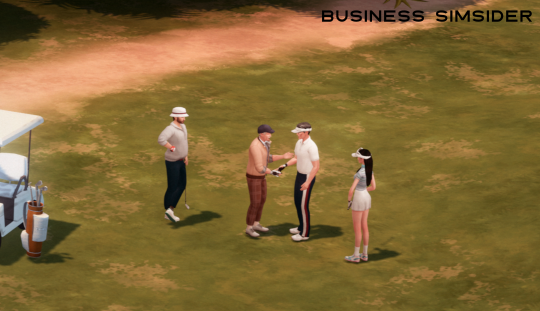

A Deal Behind Closed Doors?
While there has been no public disclosure of a purchase or formal agreement, sources close to the matter suggest that a deal may have already been struck behind the scenes. Analysts point to Lesmana’s pattern of discreet negotiations before major corporate expansions. The lack of any official denial from city officials or Lesmana representatives has only fueled further speculation.
“It wouldn’t be the first time we’ve seen a major player move in before the public catches wind of it,” said investment strategist Helen Feng. “If Lesmana Enterprise is involved, you can expect high-value real estate shifts, rezoning efforts, and possibly a large-scale redevelopment project.”
Willow Creek Residents in the Dark
On the ground in Willow Creek, however, locals seem unaware of any such plans. When asked about the rumored deal, longtime residents expressed confusion. “I haven’t heard anything about that,” said Eliza Pancakes, who has lived in Willow Creek for over a decade. “But if Lesmana’s getting involved, I just hope they don’t push people out.”
Concerns over corporate takeovers and gentrification are not new. Lesmana Enterprise’s past projects have been praised for their modern infrastructure but have also drawn criticism for displacing lower-income communities, such as the landed house projects in San Myshuno's spice market borough. If the speculation turns out to be true, questions will arise over what this could mean for Willow Creek’s future.
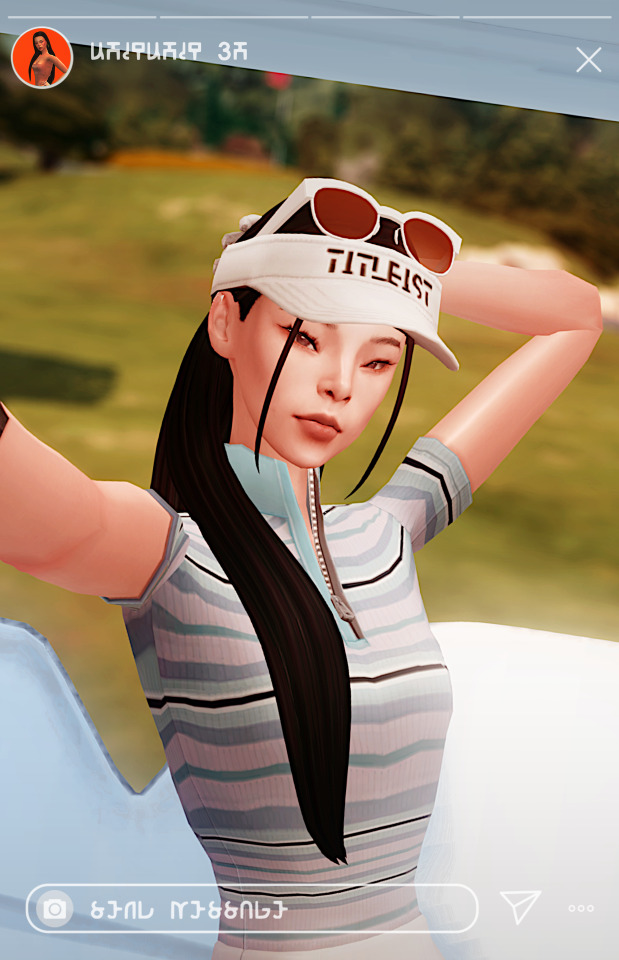
Adding Fuel to the Fire
As if the speculation wasn’t enough, Seo Yeon Kim, ex member of the famed S-pop girl group Lumina, now wife of Kieran Lesmana, unintentionally added more fuel to the online debate with a recent Simstagram story. Posting a casual selfie followed by videos of her day on the greens, she subtly reminded followers that Senator Fryer and Mayor Scott has been a longtime family friend of the Lesmanas.
This seemingly innocuous post has ignited heated discussions online. Some argue that her presence simply reinforces the existing ties between the Lesmanas and political figures, dismissing the golf outing as a routine social event. Others, however, see it as an undeniable hint that she—whether directly or indirectly—plays a role in shaping the rumored deal.
“If it was just a friendly game, why post about it now?” one user speculated on SimNation Finance Forum. “She knows what she’s doing. This isn’t just golf—it’s strategy.”
Stay tuned as Business Simsider SimNation continues to follow this developing story.
#simblr#lesmana-enterprise-ltd#sims 4#sims 4 aesthetic#sims 4 screenshots#ts4 simblr#sims 4 no cc#the sims 4 story#sims 4 gameplay#sims 4 legacy#show us your sims#willow creek#ourstory
201 notes
·
View notes
Text
Here Are My Top 10 Favourite Ants
(Updated due to public outcry and political pressure.)
No. 10 - Yellow Crazy Ants
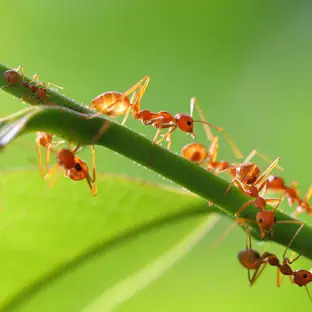
These guys are on a list of "one hundred of the world's worst invasive species" formulated by the International Union for Conservation of Nature (IUCN), having invaded ecosystems from Hawaii to the Seychelles.
But don't hate just because they are awesome at establishing themselves in a new habitat due to their aggression toward other ant species, lack of aggression toward members of their own species, efficient recruitment, and large colony size. Respect the hustle!
No. 9 - Paraponera Clavata

Also known as the "bullet ant," "the one wounding deeply," or "24-hour ant", referring to the full day of pain that follows being stung.
This ant's sting currently ranks the highest of all insect stings on Justin O. Schmidt's informal sting pain index, at 4.0+. Some victims compared the pain to that of being shot, (hence the nickname,) with "waves of burning, throbbing, all-consuming pain that continues unabated for up to 24 hours."
Lymphadenopathy, edema, tachycardia, and fresh blood appearing in human victim feces are common symptoms from even a single sting.
Un-fuck-with-able.
No. 8 - Honeypot Ants

The name honeypot ant comes from the peculiar development of replete workers, whose abdomens become so swollen with food that they are used by the rest of the colony as living food storage. They are "drained" during famine, usually the wintertime, to sustain the colony, leaving them as "flaccid depletes."
Disgusting. 10/10
When a replete worker fills with food, a portion of her digestive tract swells and displaces other abdominal organs. It can expand about four to five times its normal linear dimension when they are fully engorged with food.
I can relate. I have eaten pasta in such quantities to displace my own organs many times.
No. 7 - Red Imported Fire Ants

Though South American in origin, the red imported fire ant has been accidentally introduced to many other parts of the world.
More than 14 million people are stung by them in the United States annually. Most victims experience intense burning and swelling, followed by the formation of sterile pustules, which may remain for several days. Up to 6% of people may suffer from anaphylaxis. More than 80 deaths have been recorded from red imported fire ant attacks.
These ants thrive in urban areas. Nests can be built under pavements and foundations. This means not only can they damage or destroy individual structures, but red imported fire ants can have an affect on broader infrastructure, damaging land, business and property values. In agriculture, they can damage crops and machinery, and threaten pastures. They also pose a threat to animals and livestock, capable of inflicting serious injury or death, especially on young, weak, or sick animals.
With annual damages estimated in the billions of dollars, these ants are considered the second worst thing to arrive on North American soil since 1492.
No. 6 - Black Garden Ants
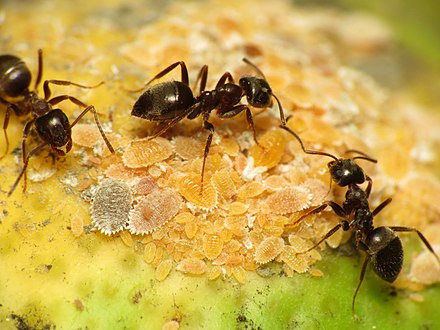
When building their colony, these ants will structure it so as to inhibit the transmission of different contagions. Different communities within the colony are segregated by a limited number of connective nodes, allowing for greater protection of vulnerable hive members, such as larvae and pupae.
A trait I could only wish other species performed so well.
No. 5 - Pharaoh Ants

These ants utilize three types of pheromones. One is a long-lasting attractive chemical that is used to build a trail network. It remains detectable even if the ants do not use the trail for several days.
The second pheromone is also attractive, but will decay to imperceptible amounts in a matter of minutes without reapplication. This pheromone is useful in marking food sources as these are unpredictable and liable to change quickly, so not worth the longer-lasting pheremone.
The third pheromone is a repellant. If an individual finds an unprofitable area with little food or significant danger, it will release this repellant pheromone, which will warn others and cause them to look elsewhere. While positive pheromones indicating lucrative foraging sites are very common in social insects, the pharaoh ant's negative pheromone is highly unusual and pharaoh ants were the first species found to employ such a thing.
No. 4 - Argentine Ant

This species is like the Mr. Worldwide of ants. It has established itself in every continent except Antarctica (including many oceanic islands.)
It even has "supercolonies" that extend across hundreds or thousands of kilometers, first reported in California in 2000, then in Europe in 2002, Japan in 2009, and Australia in 2010.
Several subsequent studies used genetic, behavioral, and chemical analyses to show that supercolonies on separate continents actually represent a single global supercolony.
The researchers stated that the "enormous extent of this population is paralleled only by human society."
How can you not admire (and fear) the ambition and the achievement?
No. 3 - Leafcutter Ants

"Leafcutter ants" is a bit of an umbrella term, as it consists of over 45 ant species, but this gang is just so remarkable. Next to humans, leafcutter ants form some of the largest and most complex animal societies on Earth. They are known for their advanced agricultural practices. These ants are not merely foragers but skilled farmers, cultivating their own food by collecting specific kinds of leaf matter in order to produce specialized fungi in their nests.
No. 2 - Formica Fusca

These ants, (sometimes called silky ants or dusky ants,) are fast to learn, and only a single presentation of stimulus is enough for them to form a genuine long-term memory. This formed memory is also resistant to extinction.
Ants of this species can also detect volatile organic compounds emitted by cancer cells. After a 3-trial conditioning, they can differentiate cancer cell lines from healthy ones. They can also differentiate between at least two different cancerous cell lines.
A similar ability to detect human tumours has been shown in more recent studies.
No. 1 - Weaver Ants
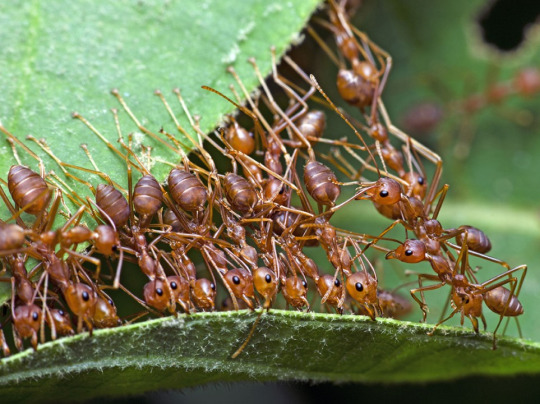
An arboreal species, (i.e. they live in trees,) weaver ants are known for their unique nest building behaviour where workers construct nests by weaving together leaves using larval silk. Colonies can be extremely large consisting of more than a hundred nests spanning numerous trees.
How they sew the leaves together is a remarkable feat of cooperation. Typically, dozens of ants will need to form a chain to first bridge a gap between two leaves, then pull them together so another team can hold them in position whilst yet more ants sew the gap together with silk. But adult ants can't make silk, so they have to use larvae to do it, picking the larvae up and using them like little pots of glue to spin a mat of silk between the two leaves. Altogether, a hundred ants might be involved in the same task. This is a pretty remarkable piece of evolution and a testament to the power of cooperation!

#ants#Myrmecology#bugblr#insectblr#bugs#insects#bug#insect#entomology#ant#antposting#invertebrates#antblr#parasites#parasitism#weaver ant#formica ant#leafcutter#bullet ant#fire ant
237 notes
·
View notes
Text
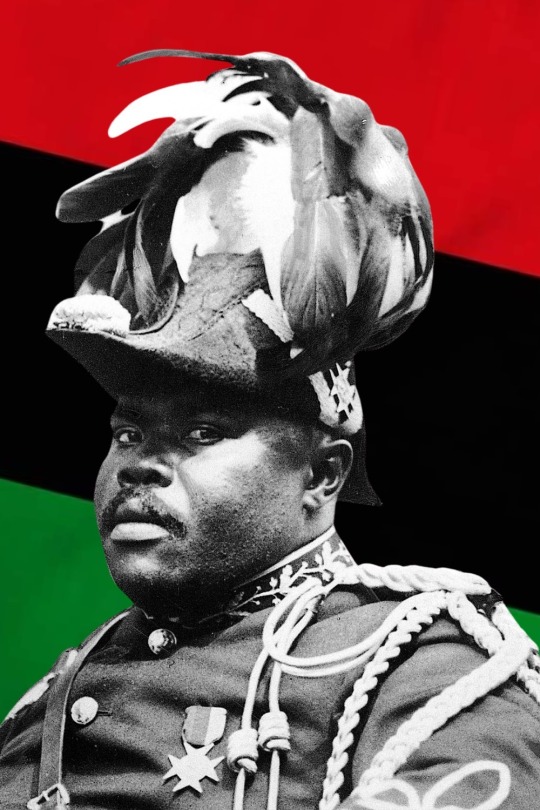
Why Black People Aren't Taken Seriously Globally: A Garveyite Perspective
Marcus Garvey’s teachings offer a powerful lens for understanding why Black people globally face challenges in being taken seriously or respected. His philosophy of Black nationalism and Pan-Africanism highlights systemic, cultural, and internal factors that have contributed to this struggle. Let’s break it down:
1. Lack of Unity: Garvey said it best: "A divided people are easily dominated." Without unity—whether due to tribalism, classism, or national divisions—the global Black community struggles to assert collective power.
2. Economic Dependency: Garvey emphasized that respect comes with economic independence. Black communities’ reliance on foreign systems and industries perpetuates cycles of exploitation and disrespect.
3. Colonial and Mental Enslavement: Centuries of slavery and colonialism didn’t just take land—they took minds. Many Black people still internalize inferiority, adopting Western standards over their own heritage.
4. Political Powerlessness: Without strong political sovereignty, Black nations and communities often end up subject to the whims of external powers. Garvey’s solution? "Africa for the Africans!"
5. Cultural Alienation: The erasure of African traditions through colonization leaves many disconnected from their roots. Reclaiming cultural pride is essential to earning global respect.
6. Scattered Identity: Black people globally lack a unified identity or voice. Garvey’s dream of Pan-Africanism sought to unite Africans and the diaspora under one banner.
7. Over-Reliance on Non-Black Leadership: Garvey criticized dependence on external leaders, emphasizing the need for Black-led solutions.
8. Propaganda and Negative Perceptions: Global media often perpetuates harmful stereotypes about Black people. Controlling our own narratives is key to countering this.
9. Weak Institutions: Without Black-owned banks, schools, or hospitals, dependence on external systems undermines the community’s autonomy.
10. Internal Resistance to Progress: Garvey noted that some resist self-improvement due to fear, ignorance, or complacency. This, he believed, holds the community back.
11. Western Cultural Dominance: The dominance of Western values marginalizes African contributions. Assimilating into these systems often comes at the expense of Black identity.
12. Educational Shortcomings: Garvey championed education in African history and achievements. A lack of this fosters ignorance and self-doubt.
13. Reparations Neglect: Failing to demand reparations for slavery and colonialism signals a lack of seriousness in addressing historical grievances.
14. Charity Over Infrastructure: Many African nations rely on foreign aid instead of building infrastructure, creating a cycle of dependency.
15. Exploitation by Foreign Powers: Africa’s wealth is drained by foreign exploitation. Regaining control of resources would shift global power dynamics.
16. Assimilation into Eurocentric Ideologies: Rejecting African traditions in favour of Eurocentric systems weakens collective pride and fosters division.
17. Poor Leadership: Garvey stressed the need for visionary leaders who prioritize collective progress over personal gain.
18. Passivity in Oppression: Accepting injustice without resistance only reinforces oppression. Bold, decisive action is required.
19. Loss of Spiritual and Moral Foundation: Materialism and individualism have replaced communal values. Garvey believed spirituality was central to empowerment.
20. Fragmented Diaspora: A weak connection between Africa and its diaspora prevents global solidarity and shared progress.
21. Neocolonial Borders: Artificial colonial borders foster division and conflict, undermining unity and progress.
22. Lack of Strategic Alliances: Garvey urged the Black community to form alliances with other oppressed groups to amplify their influence.
23. Complacency and Fear: Fear of change and comfort with familiar oppression prevent the risks necessary for progress.
24. Neglect of Garvey’s Vision: Without institutionalizing Garvey’s principles, the movement for unity, self-reliance, and African pride remains fragmented.
So What’s the solution?
The Honourable Marcus Garvey’s answer was clear: Unity, Economic independence, Reclaiming African identity and Building global solidarity.
The road to respect lies in pride, self-reliance, and unwavering determination. His vision remains a blueprint for global Black empowerment.
“If you have no confidence in self, you are twice defeated in the race of life.” – The Honourable Marcus Garvey
#black people#black#black history#black tumblr#blacktumblr#pan africanism#black conscious#africa#black power#black empowering#Garveyite#garveyism#marcus garvey#african diaspora#black diaspora#black community#black freedom#black liberation#black unity#black excellence#blog
127 notes
·
View notes
Text
fuck it we're doing lan wangji apologism now
(aka: reposting my apologism reply as it's own post now)
i know that lan wangji catches a nonzero amount of flak from the fandom for "not standing by wei ying's side during his first life," but i think we're being a bit ungenerous here. in my opinion, this was not something that he could have easily done; before pointing fingers and casting unilateral value judgements (which in this case seem to also result in the unusually high number of bastard boyfriend lan wangji fics?? fascinating events going down in wang and xian land), one should first consider all the ways in which a character's actions are not free.
first, let me restate a previously established belief of mine: jiang cheng could not politically afford to protect the wen remnants or to remain publicly tied to wei wuxian after wei wuxian attacked lanling jin's labor camp. could jiang cheng have encouraged wei wuxian to try and fix his shitty reputation himself? could jiang cheng have tried to visit more often in secret? maybe, maybe not. but the fact is that the postwar yunmeng jiang was still in the beginning stages of rebuilding from a near-complete annihilation, that it was the one great sect not included in the venerated triad's sworn brotherhood and therefore stood relatively alone, and that lanling jin by contrast was the strongest and richest sect in in the postwar period. standing by wei wuxian and in the process alienating lanling jin was not something yunmeng jiang could afford.
now, i will argue something similar for lan wangji as well: that, despite his later regrets, "standing by wei wuxian's side" is not something lan wangji could have easily afforded to do. the idea that lan wangji could have easily dropped everything to support wei wuxian, and the fact that he did not was purely due to his ~moral cowardice~ or whatever, is incorrect.
to begin, let's consider gusu lan's situation. while gusu lan did not suffer the same scale of near-complete massacre that yunmeng jiang suffered, the cloud recesses were still burned and a good portion of its priceless library lost. thus, we can conclude that postwar gusu lan also sorely needed funds, both to rebuild destroyed infrastructure and to try and replace/rewrite the books lost when the library burned. as your meme states, these funds most likely came primarily from lanling jin - due in no small part to the sworn brotherhood between gusu lan's sect leader, zewu-jun, and lianfang-zun of lanling jin. in fact, i think it's reasonable to conclude that lianfang-zun specifically played a major role in bankrolling the rebuilding of the cloud recesses.
now, how reliable is this financial support? can this financial support weather scandals - such as gusu lan's hanguang-jun publicly siding with someone who lanling jin considers to be an enemy? i don't know. on one hand, if jin guangshan is smart, he should know that having another one of the great sects owe lanling jin a tremendous and publicly known debt of gratitude is a tremendous political advantage and would help him seize the dominance over the jianghu he clearly wants. on the other hand, an ally who owes you yet will slap you in the face like this might not be worth spending that much money to support. furthermore, jin guangshan clearly thinks nothing of lianfang-zun: lianfang-zun's obvious personal investment in helping his sworn brother, then, might actually push jin guangshan away from supporting gusu lan, just to be a dick to his beloathed bastard son.
from this, i think we can conclude that gusu lan's leadership, at least, has a vested interest in keeping lanling jin happy. and keep in mind that this is not merely a "morally cowardly" position for them to take, no matter what the text of MDZS itself insists: after all, sects are not shiny baubles kept around for the enjoyment of their leaders, but rather organizations comprised of flesh-and-blood human beings who are capable of suffering and dying. gusu lan getting cut off from lanling jin's funds translates into gusu lan's infrastructure not being rebuilt, its disciples potentially not having enough housing to live in, enough clothing to wear, enough equipment to stay safe during night-hunts, or even enough food to eat. the first and foremost duty of gusu lan's leadership is towards ensuring the safety and happiness of its own people.
so where does lan wangji fall into all of this?
well, first let us consider what lan wangji is capable of doing for wei wuxian. lan wangji is not the sect leader of gusu lan; therefore, he has less power to enact change than a sect leader does. lan wangji cannot command the entire sect to take a certain course of action; he cannot directly command the funds, manpower, and other resources of gusu lan in the same way that lan xichen can. thus, if he stands with wei wuxian, it will be just him and not all of gusu lan.
but this does not rule out all possible actions lan wangji could have taken to help wei wuxian. for example, as he himself notes later on in the story, he could have chosen to stand with wei wuxian in the burial mounds. so let's consider why he did not do this.
it must be said here that lan wangji not being a sect leader means he also has more freedom to act, which is why it is more possible for him than it is for characters like lan xichen or jiang cheng to have joined wei wuxian in the burial mounds. a sect leader represents the will and intention of their sect. if someone like lan xichen takes a certain major course of action, the rest of the political world understands this to mean that said action was not just lan xichen's own will, but gusu lan's will as a whole. meanwhile, because lan wangji is not the sect leader of gusu lan, his actions do not represent the will of his sect in the same way lan xichen's actions do. lan wangji choosing a course of action entails him made a choice for himself only, not that he made a choice on the behalf of everyone in his sect. therefore, lan wangji does not have to worry as much about his actions dragging his entire sect down with him.
however, lan wangji at this point already has work he's obligated to do for his own sect. since gusu lan is actively rebuilding at this point, lan wangji has certainly been assigned a decent amount of important work essential to gusu lan's recovery. all of the work ranging from training new disciples and teaching classes to night-hunting so that gusu lan has enough of an income is necessary for gusu lan to rebuild; since lan wangji is a prominent and capable member of gusu lan, he (along with characters like lan xichen and lan qiren) is certainly responsible for a decent chunk of that work.
if lan wangji leaves gusu lan to stand in the burial mounds with wei wuxian, then he will no longer be available to do the work gusu lan has assigned him to do. this isn't even getting into the fact that if lan wangji actually did this, gusu lan would either try and force him to come home or cut him out of the sect eventually to avoid political backlash; the simple fact is that lan wangji cannot also do work for gusu lan if he is physically in the burial mounds. therefore, lan wangji going to stand with wei wuxian in the burial mounds entails lan wangji becoming unavailable to help gusu lan rebuild. and, given the fact that gusu lan raised, fed, clothed, trained, and still financially supports him, lan wangji abandoning his duties to gusu lan like this would in fact be a dereliction of duty.
therefore, lan wangji also has reasonable concerns explaining why he did not straight up leave gusu lan to go stand with wei wuxian in the burial mounds: he can't abandon his duties to his own sect.
however, these concerns do not preclude other courses of action lan wangji still could have undertaken to help wei wuxian. namely, lan wangji could have leveraged his own sterling reputation to speak for wei wuxian and help clear wei wuxian's name.
this one is honestly the hardest for me to be an apologist for....after all, lan wangji knows that wei wuxian is not raising a wen army in the burial mounds. he knows that the wen remnants are harmless, that wei wuxian does not want to hurt anyone, that wei wuxian only wants to live peacefully with the people he's protecting. lan wangji, therefore, knows that almost everything the public is saying about wei wuxian is wrong.
and lan wangji is actually someone people listen to. first of all, he's the highborn, highly capable, and quite famous member of one of the great cultivation sects. second, at this point in the story, people already hold lan wangji's honesty and moral character in high regard. the entire gusu lan sect is already viewed by the rest of the jianghu as a sect deeply concerned with righteousness and proper behavior; lan wangji specifically is respected as the honorable hanguang-jun even in comparison to the rest of gusu lan. all this goes to say that lan wangji should logically be someone whose words and opinions have weight. when he says something, especially something pertaining to morality, people should logically stop and listen in a way they would not do for many of the other characters.
since the majority of the publicly-voiced complaints against wei wuxian center around his perceived-to-be unethical behavior and his violation of social norms, if someone as heavily associated by the public with righteousness and honor as lan wangji were to speak for wei wuxian, then it is decently probably that his words might have some non-zero impact. that is not to say that wei wuxian's shitty reputation would reverse itself overnight, but it is still possible that people's thinking might change, even if only temporarily, as they struggle to understand why hanguang-jun is publicly defending the yiling patriarch. at the very least, people would talk about it.
and lan wangji doesn't have to leave gusu lan in order to do this. all he has to do is write a speech and then deliver it at the next public-enough social event; this does not entail cutting ties with gusu lan.
(i would go as far as to say that, after wei wuxian's expulsion from yunmeng jiang, lan wangji publicly defending wei wuxian would be more effective than jiang cheng publicly defending wei wuxian. for one, jiang cheng isn't held in high regard as a beacon of righteousness as lan wangji is; the fact that lan wangji gets a "-jun" title and jiang cheng doesn't already speaks volumes about how they're perceived by the public. for two, people just don't respect jiang cheng in general, while they still have some modicum of respect for lan wangji because lan wangji has gusu lan behind him. that's why lan wangji was present at the jin party wei wuxian crashed, while jiang cheng was not. for three, people are more likely to dismiss jiang cheng's hypothetical defense of wei wuxian as being unreliably biased, since jiang cheng is wei wuxian's (former) sect leader and therefore may personally benefit from defending wei wuxian; meanwhile, the fact that lan wangji is unaffiliated with wei wuxian would, in the eyes of the public, lend his defense a level of credibility born of its perceived objectivity.)
of course, none of this is guaranteed. it's entirely possible lan wangji writes a passionate op-ed in the jianghu newspaper defending wei wuxian's moral character, and everyone just assumes he's gone insane. but even if success isn't guaranteed, one might still expect someone with lan wangji's personality to try.
however, if lan wangji did in fact try to publicly speak for wei wuxian, or at the very least correct some of the misconceptions surrounding wei wuxian, we.....do not see it. in fact, if i'm recalling correctly, the only time we see lan wangji verbally defend wei wuxian in wei wuxian's first life is during that one meeting in which everyone grills jiang cheng about wei wuxian's attack on the qiongqi pass labor camp. when jin guangshan says that wei wuxian publicly disrespected jiang cheng, lan wangji spoke up to say that didn't happen; after that, lan wangji doesn't say anything else in the discussion. luo qingyang says more on wei wuxian's behalf.
(of course, it's possible that lan wangji did try to publicly speak for wei wuxian after his visit to yiling, and it all just happens offscreen because wei wuxian isn't around to see it....but i find that rather hard to believe.)
so lan wangji does not really publicly defend wei wuxian from criticism. nor do we really see him try to correct the misinformation surrounding wei wuxian, especially after he visited yiling. lan wangji has the righteous reputation but he doesn't really use it. but - is it fully reasonable to say that his silence was unambiguously wrong? should we not also consider that lan wangji probably also had decent reasons for his silence?
first, there's the fact that lan wangji is not good at public speaking. he already barely talks, which means he has next to no social skills; he also has zero experience in the political arena. he certainly does not strike me as someone with a lot of experience debating others, refuting the arguments of opponents, swaying people to his side with his words, and stopping people from turning his words against him.
therefore, it would be decently reasonable of lan wangji to fear that any potential defense of wei wuxian's character he mounts not only be ineffective, but also be turned against him.
second - and more importantly - i think that lan wangji has to consider how any potential words or actions reflect upon his entire sect. i said earlier that, because lan wangji is not the sect leader, he does not have to worry about directly dragging everyone in gusu lan down with him when he makes a decision. however, this is very much NOT to say that lan wangji doesn't have to worry about how his actions reflect upon his sect at all. though he isn't the sect leader, lan wangji is still THE hanguang-jun of gusu lan, one of gusu lan's treasured and very famous twin jades. he is also a direct member of gusu lan's main ruling line; in fact, if we go by typical male primogeniture rules, then until lan xichen marries and has a legitimate son, lan wangji is just straight-up the gusu lan sect heir.
which is all to say that, if lan wangji pulls something and the rest of the jianghu gets upset with him - if he gives an incendiary enough speech in wei wuxian's defense, for example - then there will be consequences for not just him but potentially all of gusu lan as well. as stated earlier, gusu lan on this point is dependent on financial support from lanling jin in order to rebuild. if lan wangji speaks too stridently in wei wuxian's defense and thus offends lanling jin, what will happen to that financial support? if lan wangji pisses off jin guangshan enough, lanling jin will at the very least demand that lan xichen punish lan wangji - what should lan wangji have his brother do then? and what if lanling jin instead levies more drastic consequences, such as lessening or fully cutting off their financial aid to gusu lan? what is gusu lan supposed to do then?
this is not to say that lanling jin will cut off all financial support the moment lan wangji dares say that wei wuxian doesn't eat children for dinner or something. however, lan wangji himself is someone with basically no political experience, who does not know what sorts of comments might fly and what sort of comments might not. fearing that his words might have negative consequences for his sect, therefore, is a reasonable concern for someone in his position to have. this does not necessarily justify his silence and inaction; however, it does provide an understandable reason for his choices.
thus, lan wangji also has political consequences for his entire sect to consider. though he is not the sect leader, he is still a high-profile direct-family-line member of his sect, so his words and actions still do reflect on his sect to a certain extent. and it is not "chicken" to be afraid of how one's actions or words might impact one's entire family and sect. rather, lan wangji - as someone gusu lan has raised from birth, fed, clothed, trained, and fully financially supports - has a moral obligation to consider how his actions might impact his sect.
moreover, regarding not just lan wangji's silence but also his actions in general, one must also consider the issue of filial piety. filial piety - the obligation to respect and care for one's elders, especially the people who raised you - is centrally important in chinese culture. it would be especially important in a sect as confucian as the gusu lan sect. therefore, we can expect that lan wangji was raised to hold filial piety as a key virtue to guide his behavior.
as stated above, gusu lan's leadership should logically have a vested interest in not alienating lanling jin; therefore, the elders of gusu lan, as well as lan xichen and lan qiren themselves, probably all do not want lan wangji to endanger the entire sect by publicly defending wei wuxian. if lan wangji brought up his concerns about the minsinformation surrounding wei wuxian and the wen remnants after his visit to yiling, it's highly likely that some of these leaders told him to keep his head down and mouth shut in order to avoid potentially alienating lanling jin.
therefore, it is highly plausible that lan wangji then weighed his opposing moral obligations - his duty to correct this misinformation about an innocent wei wuxian, versus his filial duty to mind the wishes of his elders and to heed their words - and decided that the latter was more important. and no matter how we as the audience feel about this choice, the fact that filial piety is something that exists and has moral weight cannot be ignored.
of course, we all know that lan wangji eventually did in fact epically yeet his filial obligations towards his elders, when he injured 33 of them after they tried to (and succeeded in) stop him from saving wei wuxian. evidently, by the time the situation had gotten that drastic, lan wangji had decided that his filial obligations were less important than saving wei wuxian. though how much of this was a moral decision versus how much of it was instead motivated by his own love for wei wuxian is debatable.
that lan wangji only acted after shit got really bad then leads me into my last point. moving away from the apologism, i also think that lan wangji......just did not expect the situation to get this bad? lan wangji is rather lacking in political sense in favor of idealism, so perhaps, when and after he visited wei wuxian in yiling, he legitimately thought that wei wuxian could just keep peacefully living in the burial mounds with the wen remnants until the jianghu forgot about them.
to explain what i mean, i think the lan wangji immediately after the sunshot campaign ended still believed in some version of the just world fallacy. sure, bad things happen to good people - the wen burned down his home and killed his father, for one - but those injustices are ultimately corrected. qishan wen attacked so many other sects and caused so much suffering, but then in return the other sects banded together and defeated the evil. now all the remaining sects are united through the wartime alliance, and there is hope for a better future.
romantic attraction towards wei wuxian aside, lan wangi probably could not initially fully condone wei wuxian's actions. wei wuxian's usage of heretical cultivation, abandonment of the proper path, and increasingly aggressive and belligerent behavior (ie. threatening to murder everyone at that one jin banquet he crashed) meant that lan wangji could not justify to himself fully supporting wei wuxian. however, when lan wangji visited wei wuxian in yiling, lan wangji then saw that wei wuxian was genuinely good: he wasn't raising an army but rather defending the innocent and downtrodden, and he relied so much on heretical cultivation because he needed it to protect the innocents depending on him. the rest of the world was wrong about wei wuxian.
but lan wangji at this point still had faith in the world. lan wangji at this point still had faith in his society. the public might make mistakes, but they're still by and large reasonable and kind; they wouldn't be led so far astray by false rumors as to actually tear apart someone only seeking to do the right thing. injustices may happen and good people may suffer, but the universe still tends towards justice: so long as one is good, one will not continue to suffer. the universe will not allow someone with purely heroic intentions to suffer and die. wei wuxian is good. society is fundamentally good. the universe is fundamentally good - therefore, lan wangji simply could not imagine that wei wuxian might actually be destroyed.
of course, he was wrong.
i think what died that day was not just lan wangji's love or his happiness, but also his fundamental faith in a just and fair universe.
anyways. this is all to say that, from my point of view, lan wangji had decently defendable reasons as to why he did not do more to support wei wuxian the first time around, and it isn't entirely fair to criticize him for his failure. lan wangji (like many of the other characters) had political concerns that the could not ignore - concerns involving other people to whom he bore a duty - and those concerns necessarily constrained his actions.
note that all of the above is not directly stated in the text, but rather the conclusions i drew myself from the facts given in the text. of course, some people who really hate lan wangji might accuse me of "making up my own version of the story" and "ignoring canon." i, however, think that reading a work of fiction entails not just blindly accepting only the facts the author spoon-feeds you, but rather drawing your own conclusions from what the story tells you. i do not need there to be a direct quote from the book saying verbatim "lan wangji was concerned about his obligations to his sect and family" to come to those conclusions myself. in fact, if the book instead tried to tell me that "lan wangji had no political or filial concerns and simply didn't help wei wuxian because he didn't like wei wuxian's demonic cultivation," then i would reject that claim wholesale as illogical.
also, lan wangji himself clearly spent 13 years beating himself up over his choices, so let's cut the poor guy a break.
45 notes
·
View notes
Text
Homicipher Theory
I haven’t finished the game, so this is a developing theory as I play. I’ve unlocked some endings. The “happy” ending, the Mr Gap endings, the observation experiment, and Mr Hood’s route. So, this is just my flow of thought
The Ghost Apartments
What are they? What is this place, technically?
We wake up in a world that’s a labyrinth of concrete halls, dilapidated rooms, and rubble. We find rooms with couches, tables, beds—standard apartment stuff. But we also find rooms with hospital beds and operating tables. Occasionally, we also find ourselves strangely in what look to be subway tunnels. It’s established that we’re somewhere in Tokyo, but in some lower ward or spirit ward of it. Earthquakes change the layout of the maze nearly constantly. We find both modern and old technology. A TV, various telephones from different stages of technology as far back as rotary phones.
It would be easy to say that it’s all just random spooky environments but that’s obviously not the case because there are clear themes.
I suspect that the Ghost Apartments are on haunted grounds, meaning it’s not the building itself that’s haunted but the property that it’s on.
Ms Nurse wears a long white nursing gown and cap reminiscent of early 1900’s Japanese nurse uniforms. We can be confident of the time period because Japanese nurses wore blue gowns prior to British influence around the 1920’s.
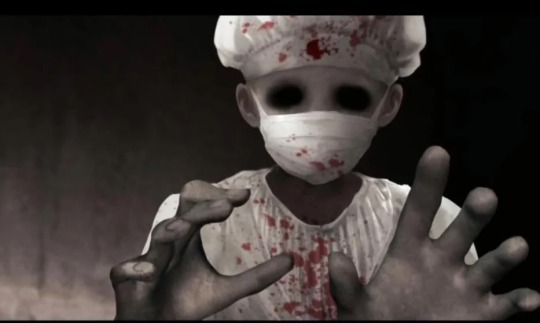
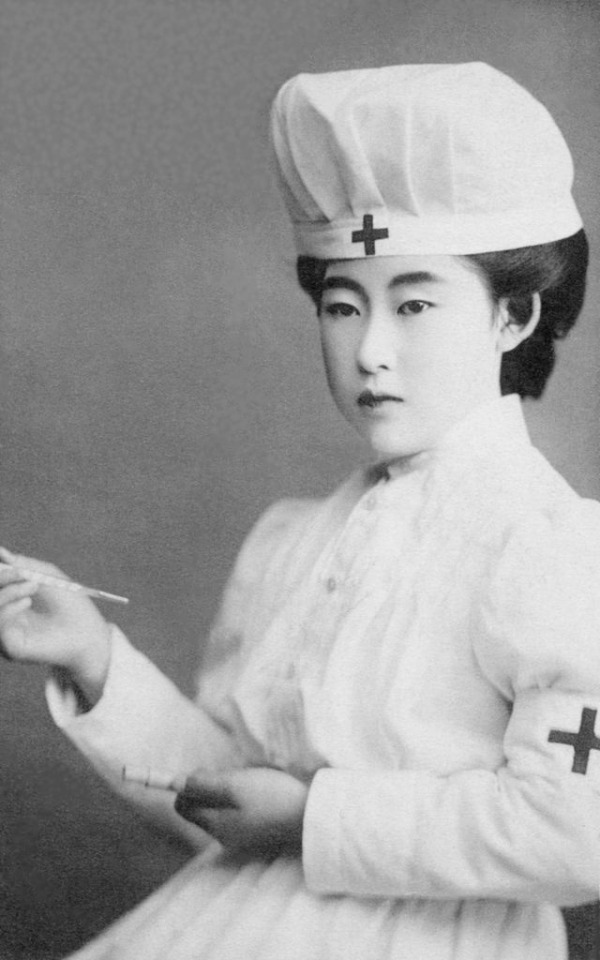
It seems obvious to me that there was once a hospital on these grounds, sometime in the 1900’s. This is likely the time period that Ms Nurse and Mr Silvair are from.
The late 1920’s is when Japan began to build its subway infrastructure. I believe that a subway must have been built on the haunted grounds (keeping in mind that haunted grounds don’t necessarily follow the zones/boundaries assigned to locations after they become haunted. Meaning that the boundaries of the haunted area might extend past where the hospital was built, such as a nearby road, or in this case, a nearby subway system).
Due to the constant presence of earthquakes in the ghost apartments, I think it’s safe to say that an earthquake befell the haunted grounds at some point, which I believe collapsed the subway system running near it.
Obviously the setting is fictitious, so this isn’t necessarily going to have real world parallels, but I did google and discover the Dakai Subway collapse of 1995, which was caused by an earthquake. This wasn’t in Tokyo, but could have been inspiration for the history of the apartments.

So, let’s assume an earthquake caused both the collapse of the subway and the previously built hospital on the haunted grounds sometime in the 90’s. Personally, I think it fits, as we have some modernly dressed ghosts who I believe died in the subway.
Ms Blue-Clad, for example. I don’t think she died during the collapse, but suspect that she tripped and landed on the subway tracks, which is why she’s missing her shoe when we find her.
ALRIGHT SO. Earthquake happens, collapses subway and hospital. In place of the hospital, an apartment complex is built. The complex still stands but is abandoned from what we can tell. Maybe construction was never finished on it due to the hauntings. I’m inclined to believe it was completed however and that some of the ghosts were residents of the apartment complex, such as Mr Gap, the Bride, maybe more.
Maybe hauntings and murders were abnormally commonplace in the apartments, so its value dropped significantly and it didn’t survive a turbulent economy and shut down. Maybe something else happened, a fire or flood (I just haven’t seen evidence of that yet myself).
I think this timeline gives us a snapshot of the haunted territory and can give hints to the characters, who they are/were, and how they died.
Am I overthinking and spending an unnecessary amount of time theorycrafting over a silly little horror visual novel game? Yes, next question.
#homicipher#homicipher game#homicipher theory#mr crawling#mr gap#ms blue clad#ms nurse#mr silvair#mr scarletella#homicipher spoilers
66 notes
·
View notes
Text
Nightmare - Crown Prince of Durmous
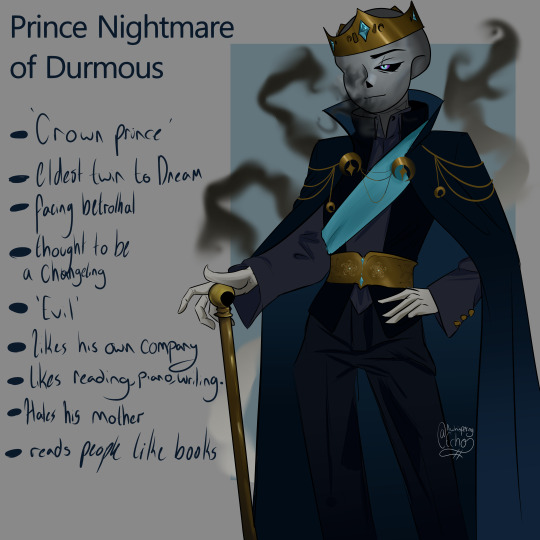
Durmous - aka, the place the story is set in! - is the largest and most prosperous kingdom, famous for its robust economy, advanced infrastructure, and diplomacy. It’s a central hub for trade and intellectual pursuits, known for its universities and libraries, which attract scholars and diplomats from far and wide.
Customs & Culture: Durmous values peace and stability, with a strong emphasis on unity and legacy. Marriages are often arranged between nobles to keep alliances strong, but the kingdom is known for its tolerance and open-mindedness, particularly regarding individual freedoms. Durmous celebrates an annual festival in the spring, honouring life and renewal, which often includes public feasts, games, and the sharing of traditional songs and stories.
Religion: While the people of Durmous are free to practice any faith, the kingdom generally honours the Celestials, a pantheon representing wisdom, justice, and compassion. They believe the stars guide the fate of royalty, and it’s common to consult astrologers on major decisions.
Royalty: Nym, Nightmare’s mother and the ruling King, is wise and forward-thinking, renowned for her strength and diplomacy. She has a strategic mind and encourages intellectual and cultural growth. Nightmare, the eldest prince, has one sibling, Dream, who has a more emotional and idealistic temperament.
Architecture: Durmous boasts dark stone castles with high, spired turrets and elaborate gothic designs. The structures have pointed arches, intricate stained glass windows, and iron detailing. Buildings are arranged in an open, sweeping formation around the palace, giving a sense of controlled elegance rather than claustrophobic defence. Courtyards and gardens feature twisted, elegant iron benches and statues of mythical beasts.
Clothing: Durmous fashions lean toward heavy, rich fabrics like velvet, silk, and brocade in dark jewel tones—deep purples, emeralds, and midnight blues. The wealthy favour sweeping cloaks and high-collared coats with elaborate embroidery and gems. They love long sleeves, tall boots, and rings with dark stones, reflecting a sense of mystery. Even in common clothing, Durmous citizens prefer dark tones, which plays well with darker dyes like indigo and crimson from locally grown grapes and fruits. This makes Dream, with his preference for bright yellows and blues, unusual.
Climate: The climate is temperate but misty, with frequent fog rolling in from the mountains, making mornings and evenings cool. The temperate climate makes it perfect for growing rich fruits like apples, blackberries, and grapes, which are the kingdom’s main exports. Wines from Durmous are prized for their dark, full-bodied flavours, often enriched with spices traded from distant lands.
Diet: Durmous’s diet focuses on fruits, cheeses, pastries, dark bread, and preserved meats, with a special fondness for wine and cider. They’re known for their vineyards and orchards, with wines and ciders aged to a rich, complex depth. Meals tend to be hearty but reserved—Durmous citizens are sophisticated in their preferences, enjoying quality over variety.
Fauna & Flora: The plants and herbs native to Durmous include hemlock, belladonna, elderberries, and sage. The landscape around the castle is dotted with thorny rose bushes, ivy, and climbing blackberries, which reflect the dark and enigmatic culture. Animals in the kingdom include ravens, foxes, and large black hounds. The people of Durmous also dye their fabrics in hues taken from these plants, giving their clothing an earthy, moody tone.
-
Nightmare is seen as a cruel man. he is cold, dark, and drawn to all things macabre. More than one person has called him ‘evil’ before, a creature borne of complete darkness and negativity. it was widely believed that as a child, he was swapped out for a changeling. Nightmare doesn’t know why people see him the way they do; he doesn’t realise anything’s wrong? he’s just quiet, and prefers time to himself.
he enjoys reading a great deal, and spends most of his days in the library, reading books, playing the grand piano, writing, or tending to needle work. he is naturally very smart and book savvy, but less understanding of social circumstances.
He also seem to just KNOW things that people don’t, he KNOWS secrets you’ve never told people, and he can and WILL hold them over your head if needs be. there’s no doubt he will be a GREAT leader.
Nightmare used to escape the castle grounds as a child to take a book and climb a tree, to read alone, undisturbed by his hand staff or his brother who wants to play.
Both Dream and Nightmare dislike their Mother, the King, but constantly vie for her attention.
#undertale au#undertale#rues aus#betrothal au#betrothal!au#lore drop#cus i just realised i didnt post them#tried to write this out like i was trying to sell you a house lmao#but the house is the whole kingdom - whcih you cant buy#nightmare sans#undertale au fanart#nightmare!sans#dreamtale#dreamtale sans#utmv#utmv au#utmv fanart#undertale aus#sans aus#undertale multiverse#sanscest#bad sans poly#bad sanses#bad sans gang
89 notes
·
View notes
Note
curious what your thoughts are on mental health frameworks that center themselves as “non carceral” like Project Lets in the U.S? to that anon’s question what came to mind for me is community care, interdependence, and having people to reach out to when you’re struggling. and if you have no one well then you’re shit out of luck lol. coming out of my personal experience of having no one and then finding community in disabled and mad folks.
i think peer support is worth investigating if it's something you have access to but i'm honestly pretty dubious about it for a few reasons
these initiatives are necessarily really limited in scope & i think the idea that they could ever cover a sizeable portion of the population without, to put it bluntly, a proletarian state infrastructure is very unrealistic
im frustrated by the use of terms like 'non-carceral' without reference to any single basic principle of communism lol. i don't think this is serious politics and listen, sometimes with specific services it doesn't really matter: i go to the needle exchange for needles, i don't need the person there to have read marx. but psychological care is a very different matter imo, speaking partly here as someone who has always found rhe political gap unbridgeable and irreconcileable in literally every form of therapy/psychiatry/mental healthcare/peer support/&c &c &c
more to the point, you have to be so so careful about what terms like 'non-carceral' mean when you're interacting with ppl who hold professional positions in psych/medicine/social work/&c (which project lets does; per their own website one of their main organisational goals seems to be training in more of these people 🤨). like, if it comes down to it, is this person going to risk their professional certifications/paycheck/prestige to stick their neck out for my shit? i mean, maybe. but it's hard for me to imagine a scenario in which i'd personally take that gamble, certainly not without like an extensive public track record and specific legal language and even then, let's just be honest about when we're working 'outside the system' versus when we're acting as a more gentle arm of it (which, is maybe all you can do right now. but own that and be real about what you can promise from that position lol)
i have in general a pretty cynical view of what these kinds of 'peer supports' are even capable of providing even in commie utopia land. put bluntly, i think people basically turn to these (& to regular therapists) largely hoping to find social connection they lack elsewhere & i don't really think it's possible to replicate that ready-made with a semi-service relationship lol. like i don't mean this in any kind of judgmental way, i just think it is pretty intrinsically a flaw of the whole talk-therapy/'moral cure' model.
i can see the value in the kind of patient advocacy that project lets offers if you, eg, are fighting institutionalisation right at this moment & know their number & need someone in the room to talk back to a provider with you. but idek how often that works & it's a pretty far cry from what i would describe as like serious ongoing support of the type that people are often hoping they'll find in psychotherapy.
i fundamentally just don't think affective distress/alienation/whatever you want to call it is something that can be meaningfully alleviated by therapeutic intervention because i don't think it's a disease; what i've seen from these kinds of peer/alt services has been mainly a reskinning of medical models rather than even a sustained critique of them. & i don't really find that i feel a sense of 'community' (never know what that means anyway) with people i think are factually wrong & morally misguided on an issue i care about, but, that's me.
27 notes
·
View notes
Text
Trump has cut aid to South Africa because we stood with Palestine and have signed an Act which is being grossly misrepresented
Hi, I'm a white, Afrikaans South African with a family of farmers, and I will not allow the false conservative rhetoric to go unchecked. I also am a researcher in sustainable economic development who engages in real life with this discourse.
I am only taking it to Tumblr now because I believe it is important for Americans and people from other nations to understand what is really happening, and what Trump's cutting of aid really means, because the administration is already using this in its own propaganda. This propaganda also has an impact on foreign investment, as it makes people in other nations wary of investing in us.
First, the cutting of Aid
I'm going to use an analogy to help you understand what's happening. A surgeon tells you that they are going to save your daughter, no charge. You're elated by this act of compassion, and you agree. The surgeon is midway through the surgery, and then calls you and says that you must cut down the trees outside your house, the surgeon doesn't like them. You say, but it's my house? The surgeon then says that they will kill your daughter if you don't comply.
The cutting of US aid is currently happening to all nations. The only difference is that Trump's America had made a point to say that South Africa is essentially on their permanent ban list. This sudden disappearance of aid (which includes American healthcare providers) is going have a massive impact on all countries. In South Africa, it is going to lead to the death of many people with HIV/Aids through the cutting of Pepfar (which Bush, fucking Bush, started to help combat HIV/Aids globally).
Trump's America is holding the lives of thousands of the most vulnerable people in South Africa hostage in order to influence our nation's policies, therefore challenging our sovereignty. That is what is happening.
What is The Expropriation Act?
The Expropriation Act would allow government to seize land which is currently not used and does not have much market value. Technically, all governments can do this in order to build infrastructure like public transport, roads, and airports. Land which is being used for any activities (including farming, housing, and business) is not affected by this at all.
Furthermore, the only reason why conservatives are accusing the government of being racist towards white people is because the white population (which is around 8% of the entire population) owns 75% of land. So, they perceive this as a threat to white majority ownership.
Whether the Act is constitutional is being challenged in our courts. No land has been taken from anyone through this Act.
The Expropriation Act is not the same as Land Reform. South Africa has been conducting Land Reform through a willing-buyer and willing-seller model, wherein those selling land can have it bought by the government to be given to beneficiaries from disadvantaged population groups. This has been considered largely unsuccessful, due to factors such as slow implementation, the land often not being of high quality, and there being no training or further support for beneficiaries. That being said, the Expropriation Act could allow the government to accelerate Land Reform.
There are many concerns around Land Reform and Expropriation, though I personally do not think any of the political parties care about the issue of land rights and protecting farmers. Smallholder farmers, who are typically people of colour and women, are particularly at risk of losing land they farm on (and feed communities with). But this risk does not directly come from the government. It comes from local government rezoning land they farm on and selling it to private developers. Smallholder farmers have less resources to counter these developers legally, and may also not formally own the land (which is not to say that they have stolen or are squatting on it, many of them have lived on it for many generations). A key example of this is the ongoing legal battles over the Philippi Horticultural Area - check the resources for more information.
Are white South Africans being persecuted?
Western conservatives like to use us white South Africans as an example of how white people can be oppressed. This is not just something America has done, nations like Australia are also guilty. Along with cutting aid, America has also declared that "the United States shall promote the resettlement of Afrikaner refugees escaping government-sponsored race-based discrimination, including racially discriminatory property confiscation."
So, are white South Africans refugees?
For fuck's sake. No.
I know very well that poverty and unemployment is at an all-time high for white South Africans. I know many white South Africans who are struggling to get food and healthcare. However, this is not because we are oppressed. This is because we are less shielded from the reality of the socioeconomic crises South Africa faces. I must emphasise, we are LESS shielded, but still much MORE shielded than the vast majority of South Africans.
Decades of Apartheid rule gave our families opportunities, education, occupations, and land which has given us a very strong net in the forms of private asset ownership, as well as professional networks. White South Africans usually have family they can lean on. Heck, I am one of them - I cannot afford my extremely high healthcare costs (I have an autoimmune condition which would leave me disabled without expensive medication), but my immediate family are able to financially support me.
It is through this accumulated wealth and professional networks that leads to all of the socioeconomic ills our nation faces being disproportionately levied on people of colour. In fact, white South Africans of all educational backgrounds have an unemployment rate of 7.9%, compared to an unemployment rate of 37.6% for black South Africans.
Affirmative action tries to balance this. I know, for a fact, that I did not get a job because of affirmative action. But I also knew that I had family that could sign my new lease for me when I had no contract. The person who got the job was statistically much more likely to have not had that luxury. And, regardless, I got a (better paying) job two weeks later. Yes, I worked hard for it. But I also have had so many educational and professional opportunities granted to me because of my privilege. (I should also note here - my family is not extremely privileged compared to other white South Africans, my parents are blue collar workers, not vineyard or mine company owners.)
There is a lot more I could cover here, like farm murders, but I will add an article in the resources for those who are curious.
Palestine.
In December of 2023, South Africa brought a case to the International Court of Justice that accused Israel of genocide against the Palestinians in Gaza. The ICJ ruled that, yes, what is happening in Gaza is genocide.
Now, Trump wants to turn Gaza into a "Riviera". He wants to move all the people living there to neighbouring nations (who are in opposition to this), and if they don't want to leave then he is willing to use the US military to 'remove' them.
So, I ask you this. Which is the country that wants to take land from an oppressed group? Which is the country that is creating international refugees?
Trump's America clearly stated that South Africa is working against its geopolitical interests and threatening the States, and that this was one of the reasons why aid was cut. I believe that this is actually the primary reason for the aid cut. The whole 'saving Afrikaners' angle is just to make Trump's America look like heroes. In truth, Trump's America is punishing us for standing for human rights.
Do you smell that?
Musk. You have played a major role in all of this. For years, you have been working on trying to make South Africa the oppressive state your Canadian grandparents moved to.
Since you're only two generations South African, and you are a Canadian and American citizen, maybe you can't understand what I'm about to say. But I'm fucking saying it.
Hou op om Trump se poephol te lek en luister. Jy is 'n rassistiese en seksistiese fokker. Voetsek Mars toe en los ons uit.
Sources and further information
A breakdown of US aid to South Africa.
An article on the impact of losing Pepfar.
A ten minute video explaining the Act.
An article summarising Trump's cutting of aid.
A more in-depth article looking into the context of him cutting aid.
An example of how smallholder farmers of colour are the people getting their land stolen through private developers.
A Facebook group with the most recent updates on the activists in the previous bulletpoint - they are facing more legal battles.
Unemployment rates in South Africa.
An article discussing farm murders.
48 notes
·
View notes
Text
Donald Trump wants to make America like russia
Trumps supporters would view that as a return to "traditional strong values" viewing russia through the lens of Moscow and st Petersburg
When the rest of Russia is extremely poor, and extremely out of date with its infrastructure, despite its large population, land, resources and its supposedly powerful military.
then why is none of this wealth going down there as well? Because this is the corporatist economic plan, all resources are pooled near the top including local resources which are to be moved through the channels at the top and only a small bit of what they make comes back.
This is akin to working in a factory making thousands of dollars worth of profit but only making back less then 100 dollars in a day something that is a part of corporate, earnings focused economics and is what people would have critiqued in the Soviet union but happen in spades in America and the Soviet union.
This is because the Soviet union while having collectivist policies this collective is managed in a way that benefits the state and then after the Soviet unions fall, putin and the oligarchy.
And we our country and China do these exact things leading to pockets of great success with pockets of impoverished towns that are reliant on government aid. Ironically in america despite these areas being largely republican which usually dislikes government aid.
As well in America we have medium areas of moderate wealth but these are shrinking, the older generations that live in large but affordable houses are moving on while the younger generations are unable to move into these houses because they're no longer priced as affordable despite the increase in houses, apartments and condos, the prices are ballooning leading to infinite empty houses and a dying middle class until we are as disparited I'm wealth as russia and China.
This is because the only successes that matter are the ones at the top, the ones that trump and elon are focused on, they are gutting government services that are vital to American life while making living hostile.
Now the possible outcome is that trumps claims that he's bringing back blue collar jobs in America despite it being corporations that moved to manufacturing in places like China because of how cheap and "efficient" they are but I digress.
The likely outcome may be that he will dismantle protections in workers allowing the working class to be a cheap and "efficient" as china at which point he'll claim success on bringing back the working class when all he's actually done is eliminate american quality of life.
But to circle back to the beggining of this short essay, trumps supporters will claim this all a huge success because even though the quality of life is in the bin and there will be little access to commodities, in there eyes at least there will be no blacks and "dei" hires at their job, the lady they had sex with was forced to become their "happy" wife because she got pregnant and trans people and immigrants are in cages or dead. A return to "the good old days".
#transgender#trans rights#lgbt#politics#gay#us politics#donald trump#trump administration#fuck trump#russia#vladimir putin#putin#china#elon musk#musk#dei#abortion#feminism#people of color#important#america#amerikkka
24 notes
·
View notes
Text
The Regulatory Standards Bill is the worst & most dangerous proposed by this corrupt government and submissions on it close Monday 12th Jan at 11.59pm
That is TOMORROW so please please please submit because they are sneaking it through using the other bills as distractions!
This bill if it passed would rewrite how laws are made in Aotearoa, forcing our laws to comply with Act's extreme libertarian values: prioritising business profit over human wellbeing, environmental protection & the treaty of waitangi. It has been described as one of the most regressive & dangerous bills ever considered, and as a " legal straight jacket" for government. I've also seen it described as trying to make Aotearoa into America and honestly they're not wrong.
From the above guide:
Here is an overview of some of the key principles and some of their potential consequences:
* Selected aspects of the rule of law, including equality before the law - which may sound good but in practice can mean protecting existing unequal interests e.g. the property rights of the “haves” get protected, while actions to increase fairness and equality for the “have nots” are restricted e.g. affirmative action for marginalised groups or vulnerable natural places or resources we all value
* Limitations on administrative discretion i.e. government decision making - this would kneecap future governments from making decisions for the good of all.
* Focus on extreme individualistic rights and property rights. These rights could only be limited by legislation if necessary to protect another person’s (or corporation’s) individual or property rights. Usually the government balances a range of rights and interests, including individual rights, property rights, human rights, societal wellbeing, the environment, and te Tiriti. Governments would no longer be freely able to balance a wide range of rights and interests.
*Restrictions on taxes, fees and levies which would significantly reduce the ability of government to fund the public services and infrastructure we rely on.
*Limitations on executive decision making (i.e. ministers and departments) and the right of review or appeal on executive decisions that affect certain rights, liberties and obligations.
*Massive deregulation across the board through application of the narrow definition of regulatory stewardship.
*A strong clause on the taking or impairing of property, including the requirement for fair compensation. This is similar to Free Trade Agreements which New Zealand has decided are too extreme to sign up to as they would create huge liabilities. Under this principle any limitations on the unhindered rights to use property (including, for example, land for development, intellectual property, mining licenses etc.) would mean that the government could be sued for compensation for lost future income and profits.
For example, if new rules restricted mining in sensitive areas due to environmental concerns or prohibited tobacco advertising to protect public health, affected companies could claim their property rights or commercial interests were "taken"or “impaired” and demand compensation. Such payouts could amount to billions of dollars, taking away money from essential services like healthcare and education to pay for corporate losses.
Here are some additional articles:
Act Now On The Proposed Regulatory Standards Bill from the folks who wrote the above submission guide
The Bill For Individualism, Corporations And Neoliberalism from Climate Justice Taranaki
ACT's proposed legislation threatens all the protections in place for a healthy population and environment from Jack Santa Barbara
( @queer-disability-aotearoa your help to boost would be wonderful!)
37 notes
·
View notes
Text
Writers Against the War on Gaza (WAWOG) is an ad hoc coalition committed to solidarity and the horizon of liberation for the Palestinian people. Drawing together writers, editors, and other culture workers, WAWOG hopes to provide ongoing infrastructure for cultural organizing in response to the war. This project is modeled on American Writers Against the War in Vietnam, an organization founded in 1965.
Statement of Solidarity
October 26, 2023
Israel’s war against Gaza is an attempt to conduct genocide against the Palestinian people. This war did not begin on October 7th. However, in the last 19 days, the Israeli military has killed over 6,500 Palestinians, including more than 2,500 children, and wounded over 17,000. Gaza is the world’s largest open-air prison: its 2 million residents—a majority of whom are refugees, descendants of those whose land was stolen in 1948—have been deprived of basic human rights since the blockade in 2006. We share the assertions of human rights groups, scholars, and, above all, everyday Palestinians: Israel is an apartheid state, designed to privilege Jewish citizens at the expense of Palestinians, heedless of the many Jewish people, both in Israel and across the diaspora, who oppose their own conscription in an ethno-nationalist project.
We come together as writers, journalists, academics, artists, and other culture workers to express our solidarity with the people of Palestine. We stand with their anticolonial struggle for freedom and for self-determination, and with their right to resist occupation. We stand firmly by Gaza’s people, victims of a genocidal war the United States government continues to fund and arm with military aid—a crisis compounded by the illegal settlement and dispossession of the West Bank and the subjugation of Palestinians within the state of Israel.
We stand in opposition to the silencing of dissent and to racist and revisionist media cycles, further perpetuated by Israel’s attempts to bar reporting in Gaza, where journalists have been both denied entry and targeted by Israeli forces. At least 24 journalists in Gaza have now been killed. Internationally, writers and cultural workers have faced severe harassment, workplace retribution, and job loss for expressing solidarity with Palestine, whether by stating facts about their continued occupation, or for amplifying the voices of others. These are instances that mark severe incursions against supposed speech protections. Specious charges of antisemitism are leveled against Zionism’s critics; political repression has been particularly aggressive against the free speech of Muslim, Arab, and Black people living in the US and across the globe. As was the case following the September 11th attacks, Islamophobic political fervor and the widespread circulation of unsubstantiated claims has galvanized a US-led coalition of military support for a brutal campaign of violence.
What can we do to intervene against Israel’s eliminationist assault on the Palestinian people? Words alone cannot stop the onslaught of devastation of Palestinian homes and lives, backed shamelessly and without hesitation by the entire axis of Western power. At the same time, we must reckon with the role words and images play in the war on Gaza and the ferocious support they have engendered: Israel’s defense minister announced the siege as a fight against “human animals”; even as we learned that Israel had rained bombs down on densely populated urban neighborhoods and deployed white phosphorus in Gaza City, the New York Times editorial board wrote that “what Israel is fighting to defend is a society that values human life and the rule of law”; establishment media outlets continue to describe Hamas’s attack on Israel as “unprovoked.” Writers Against the War on Gaza rejects this perversion of meaning, wherein a nuclear state can declare itself a victim in perpetuity while openly enacting genocide. We condemn those in our industries who continue to enable apartheid and genocide. We cannot write a free Palestine into existence, buttogether we must do all we possibly can to reject narratives that soothe Western complicity in ethnic cleansing.
We act alongside other writers, scholars, and artists who have expressed solidarity with the Palestinian cause, drawing inspiration from the Palestinian spirit of sumud, steadfastness, and resistance. Since 2004, the Palestinian Campaign for the Academic and Cultural Boycott of Israel (PACBI) has advocated for organizations to join a boycott of institutions representing the Israeli state or cultural institutions complicit with its apartheid regime. We call on all our colleagues working in cultural institutions to endorse that boycott. And we invite writers, editors, journalists, scholars, artists, musicians, actors, and anyone in creative and academic work to sign this statement. Join us in building a new cultural front for a free Palestine.
Signed,
WAWOG Interim Organizing Committee
Hannah Black
Ari Brostoff (Senior Editor, Jewish Currents)
Elena Comay del Junco
Kyle Dacuyan (Executive Director, Poetry Project)
Kay Gabriel (Editorial Director, Poetry Project)
Kaleem Hawa
E. Tammy Kim
Shiv Kotecha
Wendy Lotterman (Associate Editor, Parapraxis)
Muna Mire
Perwana Nazif
Brendan O'Connor
Alex Press (Staff Writer, Jacobin)
Sarah Nicole Prickett
Dylan Saba
Zoé Samudzi (Associate Editor, Parapraxis)
Jasmine Sanders
Claire Schwartz (Culture Editor, Jewish Currents)
Janique Vigier
Harron Walker
Chloe Watlington
Gabriel Winant (Department of History, University of Chicago)
Audrey Wollen
Hannah Zeavin (Founding Editor, Parapraxis)
Signed, In Solidarity
Fatimah Warner (Noname)
Saul Williams
Susan Sarandon
Janeane Garofalo
Gael García Bernal
Danez Smith
Ocean Vuong
Aria Aber
Saidiya Hartman
China Miéville
+ full list here
#writers against the war on gaza#wawog#free palestine#this letter is the one#you know how i encountered this when you see one of the people who signed#text#noname#susan sarandon#saul williams#gael garcia bernal#ocean vuong#joel kim booster#what a pleasant surprise#patti harrison#fariha roisin#zoe samudzi
237 notes
·
View notes
Text
The recent fires in Los Angeles have brought unimaginable pain to countless families, including my cousins, who lost their home and everything they owned. Their once-vibrant lives were reduced to ash, leaving them grappling with the trauma of displacement and the stark realization that rebuilding is far from simple. This tragedy isn’t just about flames consuming homes; it’s about the cracks in our systems that turn disasters into personal hells.
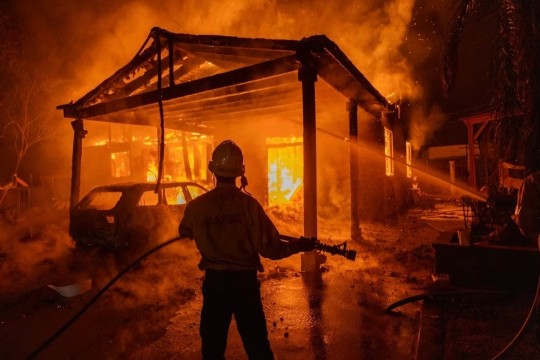
The governor’s response, or lack thereof, cannot be ignored. While promises of aid and rebuilding flood the headlines, those on the ground, like my cousins, are left to fend for themselves. Insurance companies, often touted as safety nets, have proven to be anything but. Their claims are being delayed, reduced, or outright denied, leaving families stranded in limbo. This raises a question: Why does the system consistently fail the people it's meant to protect?

Compounding this, there’s a growing suspicion about the fire’s origins. Was this truly a natural disaster, or something more deliberate? The location of the fires, the pace at which they spread, and the land’s value post-disaster spark unsettling theories. Could this be a calculated move to clear prime real estate or bury secrets? It’s hard not to draw connections to the disturbing underbelly of recent revelations surrounding elite networks and their alleged crimes, including pedophilia. Are these fires part of a larger, more sinister plot to divert attention or destroy evidence?

Adding fuel to the fire, Diversity, Equity, and Inclusion (DEI) initiatives, though well-intentioned, may have inadvertently played a role in the chaos. Mismanagement of resources under the guise of inclusivity has left critical infrastructure vulnerable. Instead of focusing on merit and efficiency, priorities shifted, weakening the systems that could have prevented or mitigated the disaster.

This fire is more than a tragedy; it’s a reflection of systemic failures and potentially hidden agendas. As my cousins struggle to rebuild their lives, the questions loom large: How do we hold those in power accountable? And what truths lie buried beneath the ashes?
#la fires#fire and blood#gavin newscum#gavin newsom#homeless#questions#conspiracy theories#trump#elon musk
39 notes
·
View notes
Text
What is Socialism, from an Anarchist
Socialism is more than just an economic system—it’s a political philosophy rooted in collective ownership and democratic control over resources and the means of production: land, infrastructure, factories, and beyond. It prioritizes meeting people’s needs over profit and aims to dismantle systems that concentrate wealth and power in the hands of a few. Central to socialism is solidarity—not as a transactional exchange, but as a commitment to care for one another, especially when someone can’t “give back.” As Marx put it, “From each according to their ability, to each according to their need.” In a truly socialist framework, people deserve housing, food, healthcare, and dignity—not because they’ve earned it, but because they’re human.
Mutual aid reflects this spirit—neighbors supporting one another without bureaucratic gatekeeping—but it alone isn’t enough. It must be part of a broader strategy to transform the systems that create scarcity and harm in the first place.
I used to believe that organizing alongside others who claimed to share these values meant I would be treated with the same care and solidarity I offered. I was wrong. After a covert operation left me unable to work or be “productive,” I was targeted rather than supported. My inability to “give back” was scrutinized and weaponized as justification to alienate me. And despite all the mutual aid I had consistently offered—often at personal cost—it was never extended in return.
It wasn’t just a personal betrayal—it was a collective failure. A community that claimed to stand for justice acted instead out of self-interest, control, and cowardice.
Socialist values are not abstract. They’ve been applied in real-world structures, like worker cooperatives rooted in egalitarianism, shared ownership, democratic decision-making, and fair distribution of labor and profit. These are tangible ways to live out the principles we claim to believe in. But the group I was in failed to uphold any of that. Despite identifying as socialists and showing support and understanding for others who struggled or needed accommodations, when I needed time away—after a long and dangerous series of events—they suddenly operated with a deeply capitalistic mindset: obsessed with productivity, reliant on punitive logic around conflict without examining the conditions that led to it, and quick to discard those they could no longer benefit off of.
Worse still, a director in that group who claimed to be a socialist openly idealized authoritarianism. They invoked Stalin as a model of leadership and adopted top-down management styles rooted in intimidation and control—not collaboration or care. Dissent was punished. Dignity was denied. These tactics alienated not just me, but many who might have been allies.
While I stood for anarchism and self-managed, stateless forms of solidarity, I’m no longer convinced that anyone in that group ever truly embodied socialist values. The disconnect between their rhetoric and their actions exposed the hollowness of their politics. It made one thing clear: claiming socialism means nothing if your practice replicates the very hierarchies and violence we’re supposed to be fighting.
#socialism#leftism#marxism#karl marx#capitalism#anarchism#anticapitalism#anarchocommunism#revolution#solidarity
16 notes
·
View notes